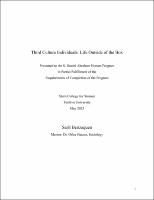Please use this identifier to cite or link to this item:
https://hdl.handle.net/20.500.12202/8981| Title: | Third culture individuals: Life outside of the box |
| Authors: | Hauser, Orlee Benzaquen, Sarit |
| Keywords: | third culture family background social orientation |
| Issue Date: | May-2023 |
| Publisher: | Yeshiva University |
| Citation: | Benzaquen, S. (2023, May). Third culture individuals: Life outside of the box [Unpublished undergraduate honors thesis, Yeshiva University]. |
| Series/Report no.: | S. Daniel Abraham Honors Program;May 2023 |
| Abstract: | There is a great deal of research on second-generation individuals. A second-generation individual is someone who is a child of an immigrant. However, there is a new area of research emerging on the idea of a person having a third culture. The third culture is the term that refers to the “mixed identity that a child assumes, influenced both by their parents' culture and the culture in which they are raised.” (Merriam-Webster Dictionary, n.d.). A third culture individual has three cultures: their parents’ culture, their current culture—for example, the culture of the United States if they live in the United States—and the third culture is the one that emerges from the mix of the first two. Many children don’t completely identify with the culture in which they are currently immersed or the culture of their parents, thus, a third culture is created. For example, a third culture individual could have one parent from Nigeria, another from France, and be living in the United States. Highlighting this sentiment, Ndéla Faye, a writer and third culture individual, says that when asked where she is from, “depending on the person and situation, I’ll have different answers to that dreaded question” (Faye, 2016). ¶ This study looked at seventy-five third culture individuals’ backgrounds and views in their journey as a child of at least one parent from a country other than the United States. The research findings show that depending on each individual’s unique background and family situation, the third culture person sees their differences as a strength that they can use to see the world through a different lens, relate to others, and help others adapt to society, or as a weakness that makes them feel like they don’t belong. |
| Description: | Undergraduate honors thesis / Open Access |
| URI: | https://hdl.handle.net/20.500.12202/8981 |
| Appears in Collections: | S. Daniel Abraham Honors Student Theses |
Files in This Item:
| File | Description | Size | Format | |
|---|---|---|---|---|
| Sarit Benzaquen, Third culture OA May 2023.pdf | 796.85 kB | Adobe PDF |  View/Open |
This item is licensed under a Creative Commons License

